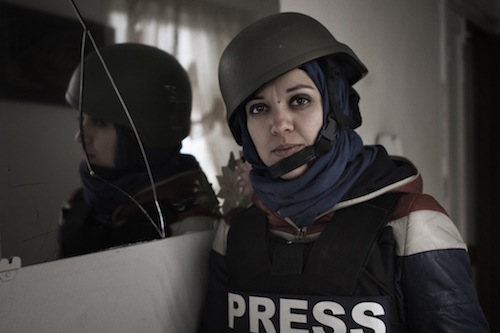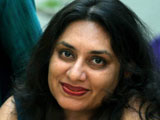This Woman’s Work
by Bina Shah / July 23, 2013 / No comments
Female reporters, war coverage, and Ernest Hemingway: Re-Defining a woman’s work.

Italian war correspondent Francesca Borri. Photo: Alessio Romenzi via Pressenza.
Recently, I came across the most moving account of the war in Syria I’ve ever read. Its author wasn’t an analyst, or a fighter, or even an aid worker. No, the writer was Francesca Borri, an Italian freelance journalist currently in Aleppo, covering the conflict for a newspaper back home. Borri’s piece appeared in the Columbia Journalism Review and details how she endured being shot in the knee and survived typhoid fever to earn just $70 per article. She also explains how her editors in Italy are only interested in pieces that portray Syria as a bloodbath, with no nuance or understanding of the forces that created the conflict in the first place.

- Pakistan is a country of contradictions – full of promise for growth, modernity and progress, yet shrouded by political, social and cultural issues that undermine its quest for identity and integrity. My bi-monthly column “Pakistan Unveiled” presents stories that showcase the Pakistani struggle for freedom of expression, an end to censorship, and a more open and balanced society.

- Bina Shah is a Karachi-based journalist and fiction writer and has taught writing at the university level. She is the author of four novels and two collections of short stories. She is a columnist for two major English-language newspapers in Pakistan, The Dawn and The Express Tribune, and she has contributed to international newspapers including The Independent, The Guardian, and The International Herald Tribune. She is an alumnus of the International Writers Workshop (IWP 2011).
Her essay, “Woman’s Work” explains with searing honesty and a fine, dry cynicism the conditions in which she operates: No health insurance, no guarantees, editors’ refusals to buy her pieces because they don’t contain enough gore. Sometimes they run the piece under someone else’s name. And then there’s the difficulty of being a woman in an environment that, as she says, “isn’t a place for anyone…. Aleppo is all gunpowder and testosterone, and everyone is traumatized…
“Every torn-apart child we see, they come only to me, a ‘fragile’ female, and want to know how I am. And I am tempted to reply: I am as you are,” she continues.
I read this paragraph out loud during the launch of a report on the status of women in Pakistan’s media. Called “Who’s Telling Our Story” the panel discussion at the launch encompassed many of the problems Pakistani women face when trying to enter the field of media and journalism. The most challenging obstacle: Fears surrounding the safety of female reporters, especially those reporting from conflict zones and the sites of bomb blasts. I read Borri’s words to show the audience that women are fully capable of operating under the same conditions as men, and that war psychologically damages men and women in the same way. Conservative Pakistanis want to shield their daughters from this kind of trauma, and even I agree that Borri sounds more than a little unhinged from her experiences, but nobody is protecting the ordinary women who are raped, tortured, blown up, or shot in Syria or in Pakistan anyway.
Borri’s work reminded me of Ernest Hemingway, who served as a war reporter during the Spanish Civil War. Indeed, Borri could be Hemingway’s daughter, as he also observed firsthand how war could blow the human psyche to pieces as effectively as it can destroy the human body. One of my favorite Hemingway quotes, from A Farewell to Arms, had to have been inspired by what Hemingway saw during the war:
“The world breaks everyone and afterward many are strong in the broken places. But those that will not break, it kills. It kills the very good and the very gentle and the very brave impartially. If you are none of these you can be sure it will kill you too but there will be no special hurry.”
I’ve always found it heavily ironic that people use the first sentence as an inspirational quote, ignoring the rest of the paragraph’s bleak observation about the nature of war and of life itself. On the other hand, the editors of Borri’s newspaper want only the stories that portray the conflict in Syria as a bloodbath, and choose to ignore anything that does not fit that frame. Perhaps it’s the work of exceptional women and men who are reporting on conflicts to tell the whole truth about what they see, even if it breaks them, or kills them in the end.




